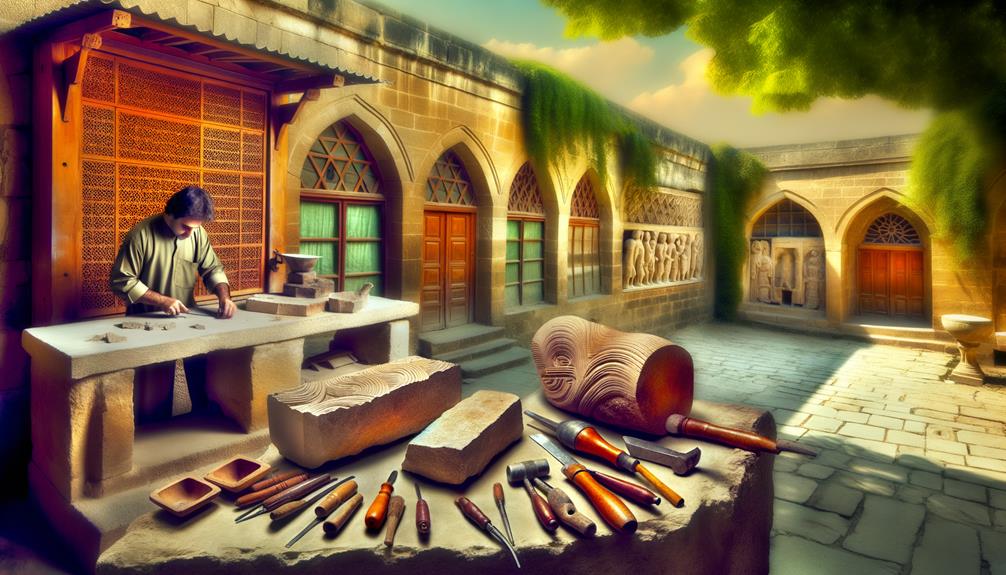Mason Name Meaning and Origin
The name Mason originates from the Old French term 'masson', reflecting a profound connection to stonemasonry, dating back to the medieval era. Historically, masons were essential artisans responsible for constructing monumental structures like cathedrals and castles.
Their profession was highly regulated by guilds, safeguarding the craft's integrity and standards. The term is rooted in the Latin 'machio', emphasizing skilled stone shaping.
Today, Mason remains popular, consistently ranking among the top names for boys in the United States, influenced by its robust, clear sound and historical significance. Discovering more uncovers the enduring legacy of this distinguished name.

Key Takeaways
- The name Mason originates from the Old French word 'masson,' meaning stoneworker.
- Historically, masons were essential craftsmen in constructing cathedrals and castles during the medieval period.
- The surname Mason is deeply tied to the ancient trade of stonemasonry and guilds.
- The name signifies craftsmanship, heritage, and the skilled art of stone shaping.
- In modern times, Mason has become a popular name for boys in the US since the 1990s.
Historical Background
The name Mason, originating from the Old French word 'masson' meaning 'stone worker,' has a rich historical background that dates back to the medieval period when stone masonry was a highly esteemed craft. During the Middle Ages, stone masons were indispensable in the construction of cathedrals, castles, and fortifications, which were pivotal to societal infrastructure and defense.
Historical records from the 12th and 13th centuries show that stone masons were organized into guilds, which regulated their trade, ensured quality, and provided mutual support. These guilds played a vital role in the development of Gothic architecture, characterized by intricate stonework and towering structures.
Therefore, the name Mason not only denotes a profession but also represents a significant cultural and architectural legacy.
Occupational Origins
The surname 'Mason' is intrinsically linked to the ancient craft of stonemasonry, a trade that has been pivotal since antiquity.
Historical records indicate that stonemasons were essential in constructing monumental structures, from the pyramids of Egypt to the cathedrals of medieval Europe.
This occupational surname reflects a lineage of skilled artisans whose expertise in cutting and shaping stone has left an indelible mark on architectural history.
Ancient Craftsmanship Roots
Historically, the term 'mason' became associated with skilled craftsmanship in stone and brickwork due to its origins from the Old French word 'maçon,' derived from the Vulgar Latin 'mattiāre,' meaning to make or construct. As early as the 12th century, artisans specialized in stone carving and bricklaying were referred to as masons, crucial for building cathedrals, castles, and fortifications. These craftsmen were highly valued for their expertise in creating durable structures.
During the medieval period, guilds and lodges formed to regulate and preserve the knowledge and standards of masonry, further solidifying the term 'mason' with notions of craftsmanship and professional integrity.
Stonemasonry in History
Tracing back to ancient civilizations, stonemasonry emerged as a distinguished occupation, pivotal in the architectural advancements of societies such as Egypt, Greece, and Rome.
In Egypt, stonemasons crafted monumental structures like the Pyramids of Giza, employing precise techniques that have puzzled modern engineers.
Greek stonemasons contributed to the construction of enduring edifices such as the Parthenon, showcasing their mastery in both form and function.
Similarly, Roman stonemasons were instrumental in constructing the Colosseum and aqueducts, epitomizing their engineering innovations.
These historical feats reflect the stonemasons' expertise and the high regard for their craft, laying the foundation for the profession's enduring legacy.
Their contributions underscore stonemasonry's vital role in shaping human history and architectural heritage.
Meaning of Mason
Mason, a name rooted in the Old French term 'maçon,' signifies an individual skilled in the craft of stonework or masonry. Historically, the name denotes a profession integral to the construction of significant architectural structures.
Derived from the Latin 'machio,' the term evolved to describe artisans who shaped stones for building purposes. The name Mason embodies:
- Craftsmanship: Representing individuals adept in stone cutting and building.
- Heritage: Reflecting a lineage of skilled tradespeople essential to medieval and modern architecture.
- Skill: Emphasizing precision, durability, and aesthetic appeal in construction.
- Legacy: Highlighting the importance of stonemasons in creating enduring monuments and buildings.
This evidence-based understanding underscores the historical and cultural significance embedded in the name Mason.
Mason in Different Cultures
The name 'Mason' originates from the medieval occupation of stonemasonry, a craft held in high esteem across various cultures. Historically, stonemasons were essential to the construction of significant architectural feats, such as cathedrals and castles in Europe.
In modern times, the name retains its historical significance while also being adopted more widely, reflecting diverse cultural interpretations and contemporary naming trends.
Historical Significance of Mason
Throughout history, the name Mason has held diverse cultural significance, reflecting the unique traditions and societal roles within various civilizations. Derived from the Old French word 'maçon,' meaning stone worker, the name has been associated with:
- Medieval Europe: Masons were integral to the construction of cathedrals and castles, embodying the era's architectural advancements.
- Ancient Egypt: Skilled masons crafted monumental structures like the pyramids, symbolizing both religious devotion and engineering prowess.
- Freemasonry: Originating in the late Middle Ages, this fraternal organization emphasized moral and ethical teachings, influencing societal values.
- Colonial America: The name gained prominence as settlers built new communities, highlighting the importance of craftsmanship in expanding frontiers.
These historical contexts underscore the enduring legacy and multifaceted roles of masons across cultures.
Mason in Modern Times
In contemporary society, the name Mason continues to reflect its rich heritage and adaptability. It manifests in various cultural contexts where it symbolizes both traditional craftsmanship and modern innovation.
In Western cultures, Mason is often associated with the Freemasons, an influential fraternal organization rooted in medieval stonemasonry. The name has surged in popularity in the United States, consistently ranking high in baby name charts.
In regions like the United Kingdom and Australia, Mason similarly enjoys widespread use. It often evokes a sense of historical depth and artisanal skill.
In non-Western cultures, while less common, the name Mason is gradually being embraced. This reflects globalization's role in spreading cultural and linguistic elements across borders, enriching its global resonance.
Cultural Interpretations of Mason
While Mason's significance in Western societies is well-documented, its cultural interpretations around the globe reveal a fascinating tapestry of meanings and associations influenced by diverse historical and social contexts.
In different cultures, the name and the concept of a 'mason' take on unique characteristics:
- Middle Eastern Societies: The mason is often revered as a master craftsman, integral to the construction of religious and communal structures.
- East Asian Cultures: Emphasis is placed on the philosophical and spiritual aspects of masonry, reflecting traditional values of harmony and balance.
- Indigenous American Tribes: Masons are seen as bearers of ancient knowledge, preserving tribal heritage through stonework.
- European Medieval Guilds: Masons held a prestigious position, with their skills considered essential for monumental architectural achievements.
These interpretations underscore the universal respect for the masonry craft.
Popularity Over Time
The popularity of the name Mason has experienced significant fluctuations over the decades, with historical records indicating a notable surge in its use during the early 21st century. This rise can be attributed to cultural shifts and increased visibility in media.
| Decade | Rank in U.S. |
|---|---|
| 1980s | Beyond Top 1000 |
| 1990s | Top 200 |
| Early 2000s | Top 20 |
Understanding these trends requires examining the broader social context and the influence of popular culture. During the 1980s, Mason was relatively obscure, but it ascended rapidly in the 1990s and early 2000s. By analyzing data from various sources, it's clear that Mason's increasing popularity reflects evolving naming conventions and societal preferences.
Modern Usage
Mason, a name that once lingered on the fringes of popularity, has now become a staple in modern naming conventions, consistently ranking within the top 10 names for boys in the United States since the early 2010s. This surge in popularity can be attributed to various factors:
- Cultural Influence: The name has been spotlighted by celebrities and public figures.
- Phonetic Appeal: Its strong, clear sound makes it attractive to many parents.
- Historical Resonance: The name's association with the skilled trade of masonry adds a layer of traditional value.
- Versatility: It works well across different cultures and languages.
This widespread acceptance underscores Mason's transformation from a niche choice to a dominant name in contemporary society.
Conclusion
The name Mason, steeped in rich historical significance and occupational origins, can be traced back to a time when the art of stone masonry was the linchpin of architectural innovation.
Its meaning, consistent across various cultures, underscores its universal appeal.
Over the centuries, the name has weathered the ebbs and flows of popularity, yet remains a stalwart in modern nomenclature.
The enduring allure of Mason is nothing short of a linguistic marvel, emblematic of timeless craftsmanship and cultural interconnectedness.






